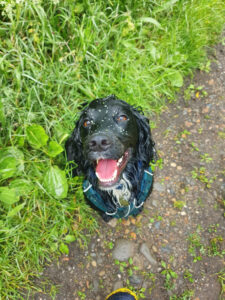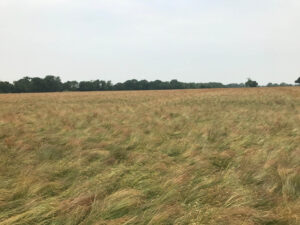Grass seeds and their potential dangers for dogs
Is grass seed safe for dogs and can I sow grass seed if I have a dog? Grass seeds pose a potential danger to dogs as they can cause severe irritation and a range of health issues. When the seeds become trapped in a dog’s fur, they can easily work their way into the ear canal, leading to irritation, inflammation, and potentially even ear infections. Ingestion of grass seeds can lead to abscesses in the lungs, which can be a serious and potentially life-threatening condition. If a seed gets into a dog’s eye, it can cause corneal abrasions and ulcerations, leading to vision loss if not promptly addressed.
Symptoms to look out for include excessive scratching or pawing at the ear, shaking of the head, coughing, difficulty breathing, and squinting or excessive tearing in the affected eye. If left untreated, the long-term effects of grass seeds on a dog’s health can include chronic ear infections, chronic respiratory issues, and even permanent vision impairment.
It is crucial for dog owners to carefully check their pet’s fur for any grass seeds and to seek veterinary attention if they suspect their dog has come into contact with them. By being aware of the dangers and symptoms associated with grass seeds, dog owners can take proactive steps to protect their pet’s health.

Dog with grass seed stuck in fur.
When can grass seed be a problem for my dog?
Generally speaking there are two types of grass that your dog might come into contact with:
- Short mown grass, i.e. lawns and parks
- Unmown grass, i.e. tall grass alongside footpaths, in fields/paddocks and around the countryside
Short mown grass is very unlikely to cause any problems as regular mowing of the grass will prevent seed heads from developing. However the tall grass you would find out in the countryside is where a dog is most likely to come into contact with grass seed, especially during the summer months.
When grass is allowed to grow tall it will produce a seed head that reaches maturity around July. Brushing against the grass can case loose seeds to come into contact with the dog.

A field of long grass with ripe seedheads should be avoided as the seed can become lodged in the dogs fur.
Sowing grass seed and dogs
When sowing a lawn with grass seed there is going to be plenty of seed close to the surface that could potentially get lodged in a dogs paw. Below are our top tips to minimise the risk of grass seed getting stuck in a dogs paw:
- The most obvious one – keep the dog off the area for as long as practically possible.
- Try to incorporate the seed into the top 15mm of the soil. The less seed that is left on the surface, the less chance if it coming into contact with the dog.
- Try to use a grass seed mixture that is fast to germinate and will cover over the soil quickly. A mixture that contains Perennial Ryegrass will germinate and establish in the quickest possible time. This means that any loose seed will soon be covered by the grass leaf blades. Mixtures containing Perennial Ryegrass, like our Hardwearing Lawn Seed, are also great for lawns with dogs, as Perennial Ryegrass is the most hard wearing grass seed.
Is your grass seed treated with chemicals?
The grass seed we supply at Grass Seed Online does not have any chemicals applied to it. Regulations surrounding the use of chemicals on seed are stringent. Whilst it is common practice for farmers to use seed that has been treated with chemicals, the same is not true of grass seed. There are no pesticide products approved for use on grass seed.
Some grass from other sources may come treated with fertilisers or other products that might claim to have beneficial properties. These treatments or coatings are usually applied for the purpose of increasing the weigh of the seed and do not actually bring a benefit.
Top Tips for Grass Seed in Dogs
- Try to avoid walking your dog in long grass, especially during the summer months when grass seed can easliy become dislodged from the grass plant.
- Long-haired dogs are particularly prone to grass seed getting stuck in their fur. Keeping your dog well groomed will make it easier to spot and remove any signs of grass seeds.
- Check you dog over as soon as you can after every walk. Removing seeds early before they get lodged deeper into the fur is much easier.
Further advice if my dog has problems with grass seed
If you are concerned about your dog, please do seek advice from a Vet. As always it is better to get a problem treated sooner rather than later. But if you want further advice on the problem of grass seed and dogs, please see links below to trusted organisation;
The Blue Cross – Grass Seed and Dogs